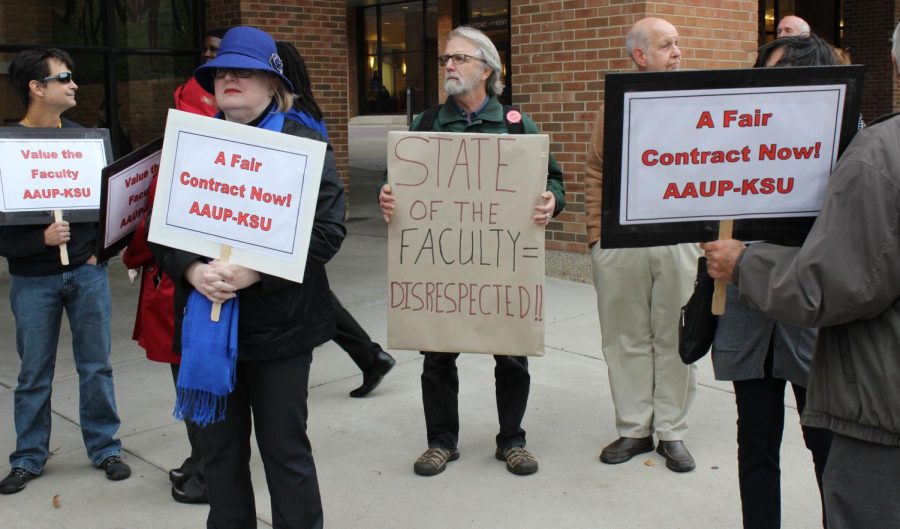Provost’s message gives insight to negotiations, fact-finder selected
“If we want Kent State to be the best university it can be, we need to invest in the faculty,” Patrick Coy (center), an applied conflict management professor of 2O years, said. “All administrators know that in their heart.”
December 1, 2015
Tension between the university negotiators became apparent on Monday after a memo to other administrators from provost and senior vice president for academic affairs Todd Diacon, was challenged by union representatives.
In a Nov. 16 memo, obtained by the Stater through a public records request, Diacon told the university administrators that after the Nov. 16 negotiation meeting — the proposals from American Association of University Professors — Kent State University did not reflect “any effort on the part of AAUP-KSU to bridge the gap between the parties’ current positions.”
The “Message from the Provost,” entitled, “Management Update on Collective Bargaining,” states “AAUP-KSU’s most recent proposal on medical benefits actually moved in the opposite direction and has increased the divide between the two parties on several key benefit issues.”
AAUP-KSU and the university’s administrators are currently in negotiations to decide a new collective bargaining agreement. Sticking points between the two sides relate to increased salaries and medical benefits. Both sides are barred from communicating directly with the media.
Diacon states in the update that the reason for it was to “provide a clear and complete picture of the entire scope of the university’s current economic and medical benefits proposals that AAUP has rejected.” He also states that communications from union leadership to members, which have been reported on in the media, “fail to reflect the full scope” of the university’s proposals.
In a communication update sent to members of AAUP-KSU, Deb Smith, the chief negotiator for the tenure track unit, criticized the provost’s message for being inaccurate.
Smith’s update states that changes between the proposal made during the Nov. 3 mediated negotiation session and the previous meeting on Aug. 3 were to certain medical benefits. Those changes involved the salary tier model for employee contributions toward the premium for medical coverage.
It further states the change was revenue neutral for the university compared with the previous proposal, maintaining the existing salary tier system.
Both proposals from AAUP-KSU rejected the university’s requirement for spousal coordination of benefits provision, which would require spouses or domestic partners of union members to obtain medical benefits from his or her employer if offered.
“Given that the salary tier model was the only change in our proposal on medical benefits, we are unsure why the administration would assert that this was somehow a move backward,” the union update determines. “We can only conclude that the administration hadn’t read our proposals with sufficient care.”
Negotiation Update
On Nov. 30, the union announced that a fact-finder was selected for the next step in contract negotiations.
Both parties selected Gregory James Van Pelt, the announcement reads, to serve in the role of fact-finder. A date for a hearing to discuss his recommendations has yet to be set. At the upcoming meeting, both the union and university negotiators will “present evidence for their respective bargaining positions.”
At the conclusion of that meeting, the arbiter will propose a recommendation for both parties, which, if accepted by both sides, will become the new contract between the university and the union. Both sides have previously agreed to tentative proposals to the contract, which will also be included in the fact-finder’s proposal.
Until that agreement is reached, the current collective bargaining contract calls for both parties to continue the negotiation process in good faith.
Contact Matthew Merchant at [email protected].












